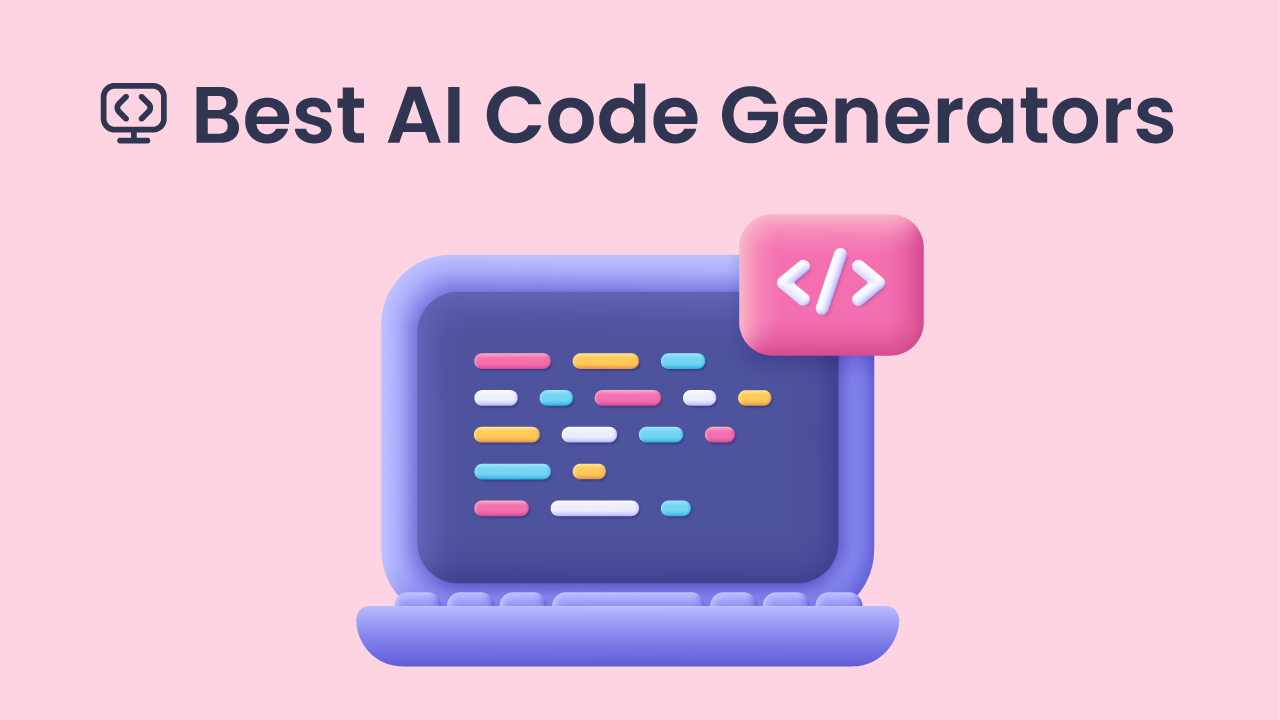In the rapidly evolving landscape of software development, finding ways to streamline the coding process while maintaining high-quality standards is a perpetual challenge. This is where AI code generators step in as game-changers, revolutionizing the way developers write code and unleashing unprecedented levels of efficiency and creativity.
AI code generators leverage the power of artificial intelligence and machine learning algorithms to automate portions of the coding process. These intelligent tools analyze existing codebases, learn from patterns and best practices, and generate code snippets or even complete modules. By doing so, they alleviate developers from repetitive and time-consuming tasks, enabling them to focus on higher-level problem-solving and innovation.
In this blog, we will delve into the world of AI code generators, exploring their capabilities, benefits, and impact on the software development landscape. We will discover how these tools empower developers, enhance productivity, and open up new possibilities for building robust and scalable applications.
Table of Contents
ToggleHere Are 10 Notable AI Code Generators
1. DeepCode
DeepCode is an AI-powered code review tool that helps developers improve code quality and identify potential issues and vulnerabilities. It uses static code analysis and machine learning algorithms to analyze codebases and provide actionable insights to developers.
DeepCode’s AI engine analyzes code patterns and identifies potential bugs, security vulnerabilities, and performance issues. It provides suggestions and recommendations to improve code quality, reduce technical debt, and enhance overall software reliability.
Key features of DeepCode include:
- Code Review: DeepCode reviews code written in various programming languages and provides real-time feedback on potential issues, such as bugs, security vulnerabilities, and code smells. It helps developers catch critical errors and improve the quality of their code.
- Automated Bug Detection: DeepCode uses AI algorithms to identify bugs in the codebase by analyzing patterns and learning from known issues. It flags potential problems and suggests fixes to prevent bugs and improve code robustness.
- Security Analysis: DeepCode scans code for security vulnerabilities, such as insecure data handling, input validation issues, and potential security risks. It helps developers proactively identify and address security flaws, minimizing the risk of breaches.
- Code Smell Detection: DeepCode detects code smells, which are indicators of poor code design or potential maintenance issues. It helps developers refactor their code and follow best practices, leading to cleaner and more maintainable codebases.
- Integration and Collaboration: DeepCode integrates with popular code repositories and development environments like GitHub, GitLab, and VS Code. It provides seamless collaboration features, allowing teams to share code reviews and collaborate on improving code quality.
- Language Support: DeepCode supports a wide range of programming languages, including Java, JavaScript, Python, C/C++, and more. It caters to diverse development environments and helps developers across different language ecosystems.
DeepCode aims to improve the efficiency and effectiveness of code reviews by leveraging AI technology. It empowers developers to write cleaner, more reliable code by detecting potential issues and providing actionable recommendations.
Also Read: How to Leverage Influencer Marketing for Your Online Marketplace?
2. Kite
Kite is an AI-powered coding assistant that enhances the coding experience by providing intelligent code completions, documentation, and coding suggestions in real-time. It integrates seamlessly into popular code editors and helps developers write code faster and with fewer errors.
Key features of Kite include:
- Intelligent Code Completion: Kite’s AI engine analyzes your code and suggests contextually relevant code completions as you type. It predicts the next lines of code, saving you time and reducing the likelihood of syntax errors.
- Inline Documentation: Kite provides rich, interactive documentation right within your code editor. It offers detailed explanations, examples, and usage instructions for functions, classes, and libraries, helping you understand and use them effectively.
- Code Snippets and Templates: Kite offers a library of code snippets and templates for common programming tasks and patterns. It allows you to quickly insert pre-written code and customize it to suit your specific needs, accelerating your coding process.
- Error and Bug Detection: Kite’s AI engine detects errors, potential bugs, and performance issues in your code. It highlights problematic code sections and provides suggestions for fixing or optimizing them, helping you write cleaner and more efficient code.
- Language Support: Kite supports a wide range of programming languages, including Python, JavaScript, Java, C/C++, Go, and more. It caters to developers across different language ecosystems, providing intelligent assistance tailored to specific languages and frameworks.
- Integration with Popular Code Editors: Kite seamlessly integrates with popular code editors such as Visual Studio Code, PyCharm, Atom, and Sublime Text. It offers a smooth coding experience within your preferred development environment.
- Machine Learning-Powered: Kite’s AI engine continuously learns from a vast amount of open-source code and developer patterns. It improves over time, adapting to your coding style and offering more accurate and relevant suggestions as you work.
Kite aims to boost developer productivity by leveraging AI to assist with code completion, documentation, and error detection. By providing intelligent suggestions and streamlining the coding process, Kite helps developers write code faster, improve code quality, and enhance their overall coding experience.
3. Codota
Codota is an AI-powered developer tool that provides intelligent code completions and suggestions to enhance the coding experience. It integrates with popular code editors and IDEs, offering context-aware code recommendations and reducing the time and effort required to write code.
Key features of Codota include:
- Intelligent Code Completion: Codota’s AI engine analyzes code patterns and context to provide accurate and relevant code completions as you type. It suggests code snippets and API calls based on the code you’ve already written, helping you save time and write code more efficiently.
- Context-Aware Suggestions: Codota understands the context of your code and provides intelligent suggestions tailored to your specific programming language, framework, and libraries. It offers insights into best practices and common patterns, improving the quality and consistency of your code.
- Comprehensive Code Search: Codota enables developers to search for code examples and solutions to specific programming problems. It searches through millions of code repositories, forums, and documentation to provide relevant examples and code snippets that can be used as a reference.
- Language and Framework Support: Codota supports a wide range of programming languages, including Java, JavaScript, Python, C++, and more. It also integrates with popular frameworks and libraries, offering specific recommendations and insights for each ecosystem.
- Integration with Code Editors and IDEs: Codota seamlessly integrates with various code editors and IDEs, such as IntelliJ IDEA, Android Studio, Eclipse, and Visual Studio Code. It provides a smooth coding experience within your preferred development environment.
- Learning from Open-Source Code: Codota’s AI engine learns from millions of lines of open-source code and developer patterns. It continuously improves its suggestions and recommendations over time, adapting to your coding style and offering more accurate and relevant insights.
- Collaboration and Team Sharing: Codota allows developers to share code examples and snippets with team members, promoting collaboration and knowledge sharing. It helps teams leverage collective coding expertise and learn from each other’s code.
Codota aims to enhance developers’ productivity and efficiency by providing intelligent code recommendations and insights. By leveraging AI technology and analyzing vast amounts of code, Codota helps developers write code faster, learn new programming patterns, and improve the quality of their code.
Also Read: Everything you need to engage customers in your community
4. Tabnine
Tabnine is an AI-powered code completion tool that integrates with popular code editors and IDEs to provide intelligent code suggestions and completions in real-time. It helps developers write code faster and with fewer errors by predicting the next lines of code based on the context and patterns it learns from vast code repositories.
Key features of Tabnine include:
- Intelligent Code Completion: Tabnine’s AI engine analyzes your code and offers context-aware code completions as you type. It predicts the most likely code snippets, functions, and variables, saving you time and reducing the need for manual typing.
- Multi-Language Support: Tabnine supports a wide range of programming languages, including Python, JavaScript, Java, C/C++, PHP, and more. It adapts to the specific syntax and coding conventions of each language, providing accurate suggestions tailored to the programming context.
- Deep Learning Models: Tabnine employs advanced deep learning models to understand the relationships between different code elements and patterns. It leverages these models to generate relevant and accurate code completions, even in complex and unfamiliar coding scenarios.
- Enhanced Productivity: By suggesting code completions, Tabnine helps developers write code faster and with fewer errors. It eliminates the need to remember specific syntax and allows developers to focus on the logic and high-level structure of their code.
- Integration with Code Editors and IDEs: Tabnine seamlessly integrates with popular code editors and IDEs, including Visual Studio Code, IntelliJ IDEA, PyCharm, and more. It provides a smooth coding experience within your preferred development environment.
- Learning from Open-Source Code: Tabnine’s AI engine continuously learns from vast repositories of open-source code to improve its code completion capabilities. It adapts to the latest coding trends and best practices, ensuring up-to-date and relevant suggestions.
- Privacy and Security: Tabnine is designed to prioritize user privacy and security. The AI engine operates locally on the developer’s machine and does not send code or data to external servers, ensuring that sensitive code remains secure.
Tabnine aims to enhance developers’ coding experience by providing intelligent and accurate code completions. By leveraging AI technology and deep learning models, Tabnine helps developers write code more efficiently, reduce errors, and increase productivity.
5. AI Dungeon
AI Dungeon is an AI-powered text adventure game that utilizes natural language processing and machine learning to generate interactive storytelling experiences. It allows players to create and explore dynamic narratives in a wide range of genres, from fantasy and sci-fi to mystery and more.
Key features of AI Dungeon include:
- Interactive Storytelling: AI Dungeon provides a platform for players to immerse themselves in interactive stories where they can make choices and shape the narrative. The AI dynamically generates story elements based on the player’s inputs, creating a unique and personalized storytelling experience.
- Natural Language Processing: AI Dungeon employs advanced natural language processing techniques to understand and respond to player inputs. It interprets text-based commands and prompts, enabling players to interact with the game using their own words and expressions.
- Infinite Possibilities: AI Dungeon offers a vast array of scenarios and settings, allowing players to explore virtually limitless storylines and adventures. From epic quests to character-driven dramas, the AI adapts to player choices and generates branching narratives based on their decisions.
- Collaborative Storytelling: AI Dungeon enables collaborative storytelling by allowing multiple players to join the same adventure. Players can take turns contributing to the narrative, building upon each other’s actions and choices to create collaborative and unpredictable storylines.
- Customization and Modding: AI Dungeon provides options for customizing the game’s settings, allowing players to tweak the AI’s behavior and adjust various parameters to suit their preferences. It also supports modding, enabling players to create and share their own custom adventures and scenarios.
- AI Dungeon Dragon: AI Dungeon offers a premium subscription called AI Dungeon Dragon, which unlocks additional features and benefits. Dragon subscribers gain access to priority access, faster response times, and other exclusive perks.
AI Dungeon pushes the boundaries of interactive storytelling by leveraging AI and natural language processing. It empowers players to participate in engaging and ever-evolving narratives, offering an immersive and creative gaming experience.
Also Read: 11 Best AI Website Builders To Create Websites 2024
6. Hugging Face
Hugging Face is an open-source platform and community that focuses on natural language processing (NLP) and machine learning. It provides a range of tools, libraries, and pre-trained models that facilitate NLP-related tasks, including text classification, language translation, question answering, and more.
Key features of Hugging Face include:
- Transformer Library: Hugging Face offers the “Transformers” library, which provides a comprehensive collection of state-of-the-art pre-trained models for various NLP tasks. These models, based on the transformer architecture, can be fine-tuned and used for tasks like sentiment analysis, named entity recognition, text generation, and more.
- Model Hub: Hugging Face’s Model Hub is a repository of pre-trained models contributed by the community. It allows users to discover, download, and use models for their specific NLP needs. The Model Hub covers a wide range of languages and applications, fostering collaboration and knowledge sharing among NLP practitioners.
- Pipelines and Tokenizers: Hugging Face provides easy-to-use pipelines that allow users to perform common NLP tasks with just a few lines of code. These pipelines handle tasks like text classification, sentiment analysis, and named entity recognition, making it convenient for developers to incorporate NLP capabilities into their applications. Hugging Face also offers tokenizers for text processing, allowing efficient encoding and decoding of textual data.
- Training and Fine-tuning: Hugging Face supports the training and fine-tuning of NLP models on custom datasets. Users can leverage the platform’s infrastructure and libraries to train models tailored to their specific tasks or domains. This capability is particularly useful for researchers and developers working on novel NLP applications.
- Community and Collaboration: Hugging Face has a vibrant community of NLP enthusiasts, researchers, and developers. The community actively contributes to the platform by sharing models, tutorials, and code snippets. Hugging Face fosters collaboration and encourages users to learn from and support each other.
- Transformers Hub: The Transformers Hub is a platform within Hugging Face where users can upload, share, and deploy their own trained models. It allows users to showcase their work, collaborate with others, and deploy their models for various NLP applications.
Hugging Face is widely used in the NLP community due to its extensive collection of pre-trained models, easy-to-use libraries, and active community support. It enables developers and researchers to leverage cutting-edge NLP capabilities, accelerate their NLP projects, and collaborate with like-minded individuals.
Also Read: Your Complete Guide to Effective Guest Post Outreach
7. GitHub Copilot
GitHub Copilot is an AI-powered code completion tool developed by GitHub in collaboration with OpenAI. It aims to assist developers in writing code by providing contextually relevant code suggestions and completions directly within their integrated development environment (IDE).
Key features of GitHub Copilot include:
- AI-powered Code Suggestions: GitHub Copilot leverages machine learning models to analyze code context and provide intelligent code suggestions in real time. It learns from a vast amount of publicly available code to offer accurate and contextually appropriate completions.
- Integrated Development Environment (IDE) Support: GitHub Copilot seamlessly integrates with popular code editors and IDEs, including Visual Studio Code. It operates as a plugin or extension, providing code completions directly within the editor as developers write their code.
- Multiple Language Support: GitHub Copilot supports a wide range of programming languages, including Python, JavaScript, TypeScript, Go, C++, and more. It adapts its suggestions to the syntax and coding conventions of the specific language being used.
- Code Generation: In addition to code completions, GitHub Copilot can generate entire code snippets or even functions based on natural language descriptions or comments. It helps speed up development by automating repetitive coding tasks and providing boilerplate code.
- Context-Aware Suggestions: GitHub Copilot takes into account the surrounding code, project structure, and relevant libraries to offer contextually appropriate suggestions. It can predict the next lines of code, complete function calls, and provide examples of how to use specific APIs.
- Learning and Improvement: GitHub Copilot continuously learns from the feedback and usage patterns of developers to improve its code suggestions. It aims to enhance its accuracy and relevance over time, making it an increasingly valuable tool for developers.
GitHub Copilot aims to increase developer productivity and efficiency by providing intelligent code suggestions and completions. By leveraging AI and machine learning, it assists developers in writing code faster, reducing the time spent on manual typing and searching for code examples.
8. Codegen
Code generation refers to the process of automatically generating source code or other artifacts based on predefined templates, rules, or specifications. It involves using tools, frameworks, or libraries to produce code that adheres to certain patterns, conventions, or requirements.
Code generation can be beneficial in several ways:
- Efficiency: Code generation automates the creation of repetitive or boilerplate code, reducing manual effort and saving time. It allows developers to focus on higher-level tasks rather than spending time on routine coding.
- Consistency: Code generation ensures consistency in code structure, style, and patterns. By following predefined templates and rules, generated code can adhere to established coding standards and conventions, leading to cleaner and more maintainable codebases.
- Productivity: With code generation, developers can quickly scaffold or create a significant portion of the codebase. This boosts productivity, especially when working on large projects or implementing complex features.
- Reduce Errors: Code generation reduces the likelihood of human errors that can occur during manual coding. Generated code is based on predefined patterns, minimizing the risk of syntax errors or logic flaws.
- Language Interoperability: Code generation can facilitate language interoperability by automatically generating code that bridges different programming languages or technologies. This simplifies integration between various components or systems.
Code generation can be implemented using various tools and frameworks, depending on the programming language and the specific requirements of the project. Some examples of code generation tools and frameworks include Yeoman, Swagger Codegen, JHipster, and various ORM (Object-Relational Mapping) libraries.
Also Read: An Odyssey of Innovation: WordPress’s 20-Year Impact on Web Development
9. ModelPlace.AI
ModelPlace.AI is an online marketplace for AI models, offering a platform where developers and researchers can discover, buy, and sell pre-trained AI models. It serves as a hub for accessing a wide range of AI models across different domains and applications.
Key features of ModelPlace.AI include:
- Diverse AI Models: ModelPlace.AI offers a diverse collection of AI models covering various fields such as computer vision, natural language processing (NLP), speech recognition, recommendation systems, and more. Developers can explore and find models that suit their specific needs and applications.
- Pre-Trained Models: The marketplace provides pre-trained models that are already trained on large datasets, saving developers the time and resources required for training from scratch. These models are ready to use and can be integrated into applications or used as a starting point for further customization and fine-tuning.
- Easy Integration: ModelPlace.AI focuses on providing models that are easy to integrate into different environments and frameworks. They often come with clear documentation, code examples, and compatibility with popular frameworks like TensorFlow and PyTorch, making it easier for developers to incorporate them into their projects.
- Model Evaluation and Comparison: ModelPlace.AI allows users to evaluate and compare different AI models based on their performance metrics, accuracy, speed, and other relevant factors. This enables developers to make informed decisions and select the most suitable models for their specific requirements.
- Community and Collaboration: ModelPlace.AI fosters a community of developers, researchers, and AI enthusiasts. It encourages collaboration, knowledge sharing, and feedback among users to enhance the quality and availability of AI models on the platform.
- Licensing and Intellectual Property: ModelPlace.AI provides clear licensing terms and ensures that intellectual property rights are respected. It facilitates the buying and selling of AI models while protecting the rights and interests of both the model creators and the users.
ModelPlace.AI aims to simplify the process of accessing and utilizing AI models by providing a centralized marketplace for developers and researchers. It offers a convenient platform for discovering, evaluating, and acquiring pre-trained models, enabling developers to leverage AI capabilities without the need for extensive training or expertise in building models from scratch.
Conclusion On AI Code Generators
AI code generators have emerged as powerful tools in the field of software development. They leverage artificial intelligence and machine learning techniques to automate and streamline the coding process, providing developers with intelligent code suggestions, completions, and even generating code snippets or functions. AI code generators tools offer several benefits, including increased efficiency, improved code quality, reduced errors, and enhanced productivity.
AI code generators save developers time by automating repetitive or boilerplate coding tasks, allowing them to focus on higher-level problem-solving and innovation. By suggesting contextually relevant code, AI code generator tools help improve code consistency, adhere to coding standards, and reduce human errors. AI code generators can handle multiple programming languages and support various development environments, making them versatile and adaptable to different projects and requirements.
Frequently Asked Questions (FAQs)
An AI code generator is a software tool that uses artificial intelligence and machine learning techniques to automatically generate code or programming scripts based on specific requirements or input.
AI code generators work by analyzing patterns in existing code, understanding the desired functionality, and generating code snippets or scripts that meet those requirements. They can assist developers by automating repetitive or complex coding tasks.
The programming languages supported by AI code generators can vary. Some generators are designed for specific languages, while others support multiple languages, including popular ones like Python, JavaScript, Java, and more.
AI-generated code is typically reliable for specific tasks and can help reduce errors. However, it’s essential for developers to review and test the generated code thoroughly to ensure security and functionality. Security vulnerabilities can still exist in AI-generated code, so careful examination is crucial.
AI code generators can benefit developers by automating repetitive coding tasks, increasing productivity, and providing code suggestions that can speed up development. They can also assist in learning and understanding coding principles by generating examples and templates. However, developers should use AI-generated code as a tool and not solely rely on it, especially for critical projects.
Interesting Reads:
How to Enhance Your WordPress Affiliate Site with AI-Powered Plugins
B2B SAAS SEO: A Complete Guide to Rank Higher and Generate More Leads








